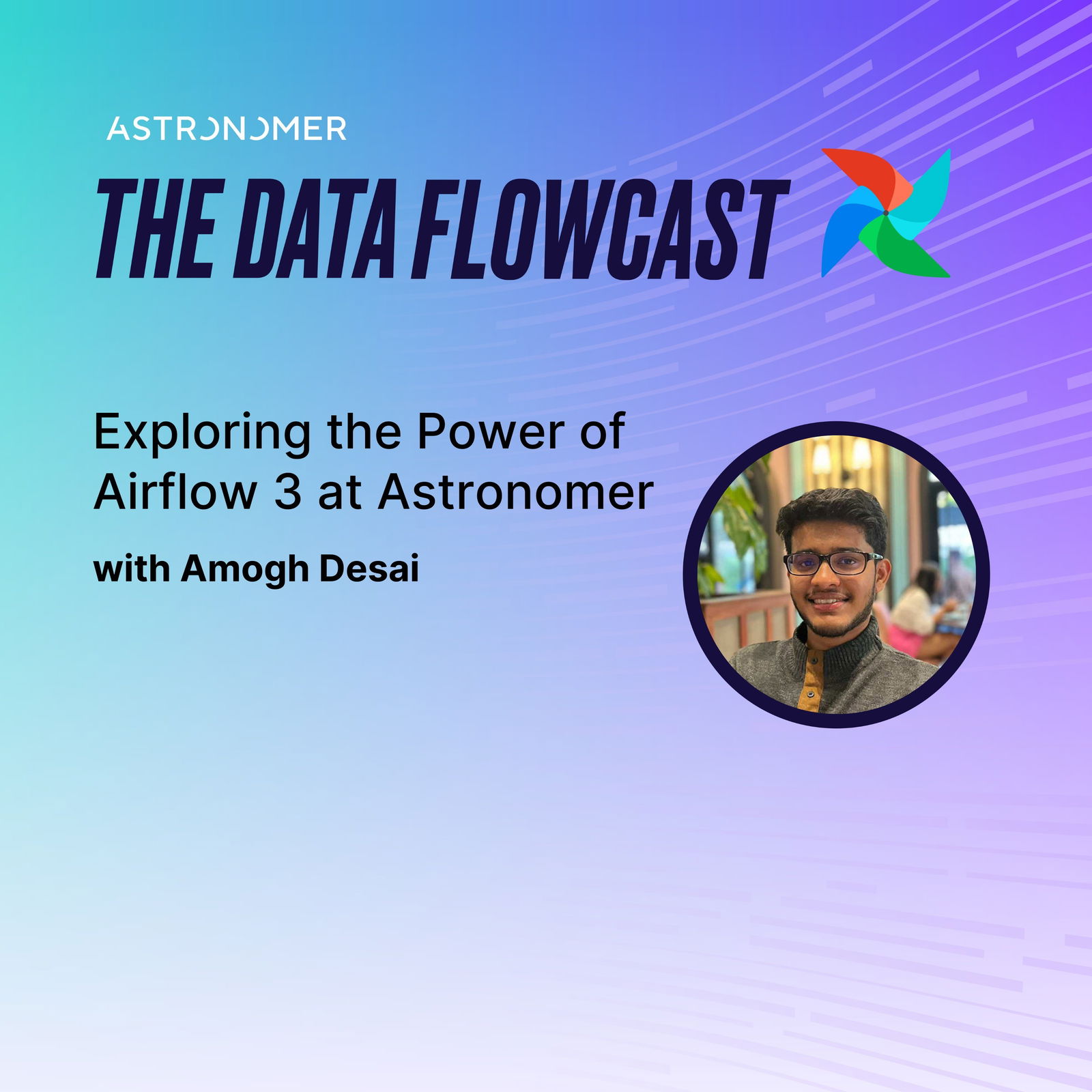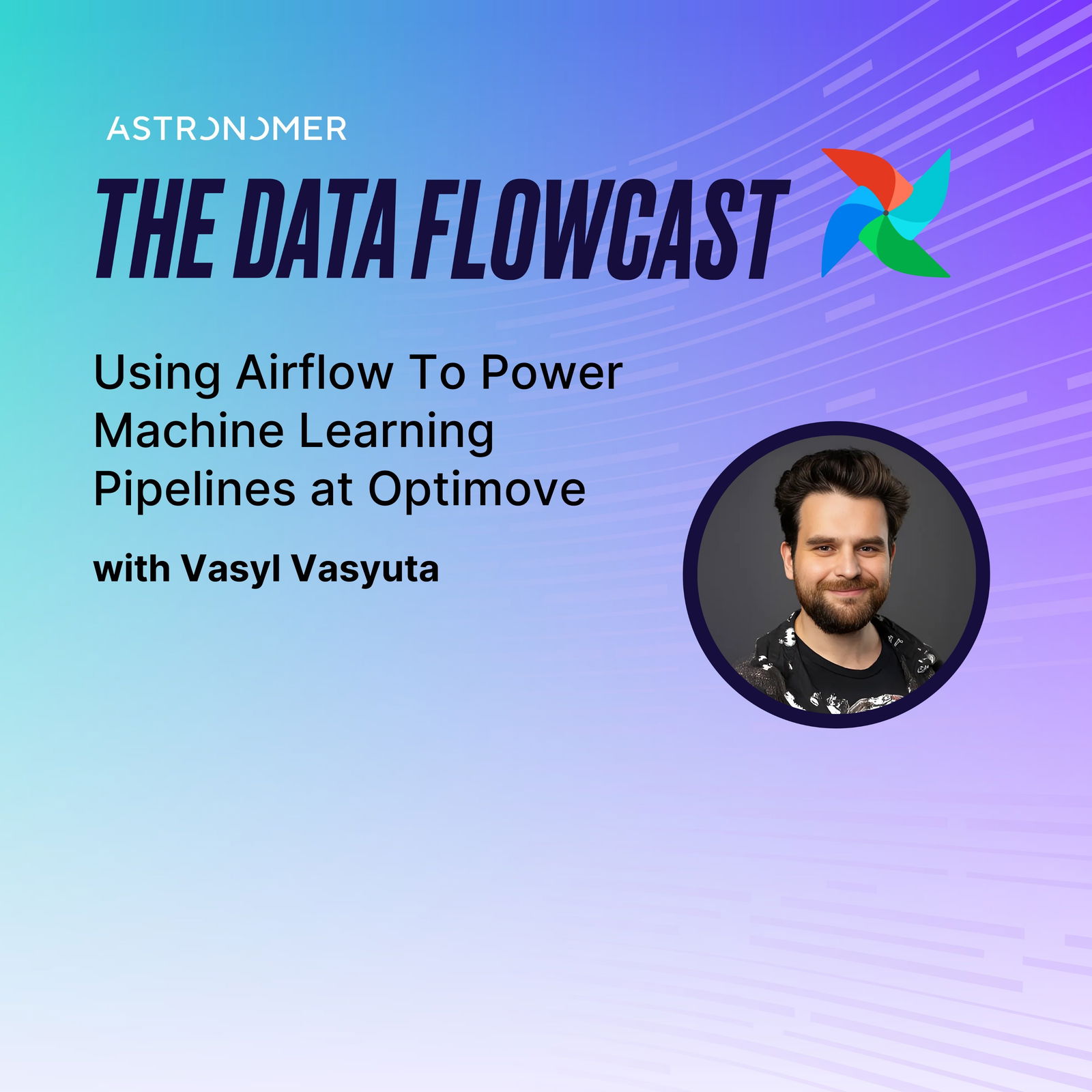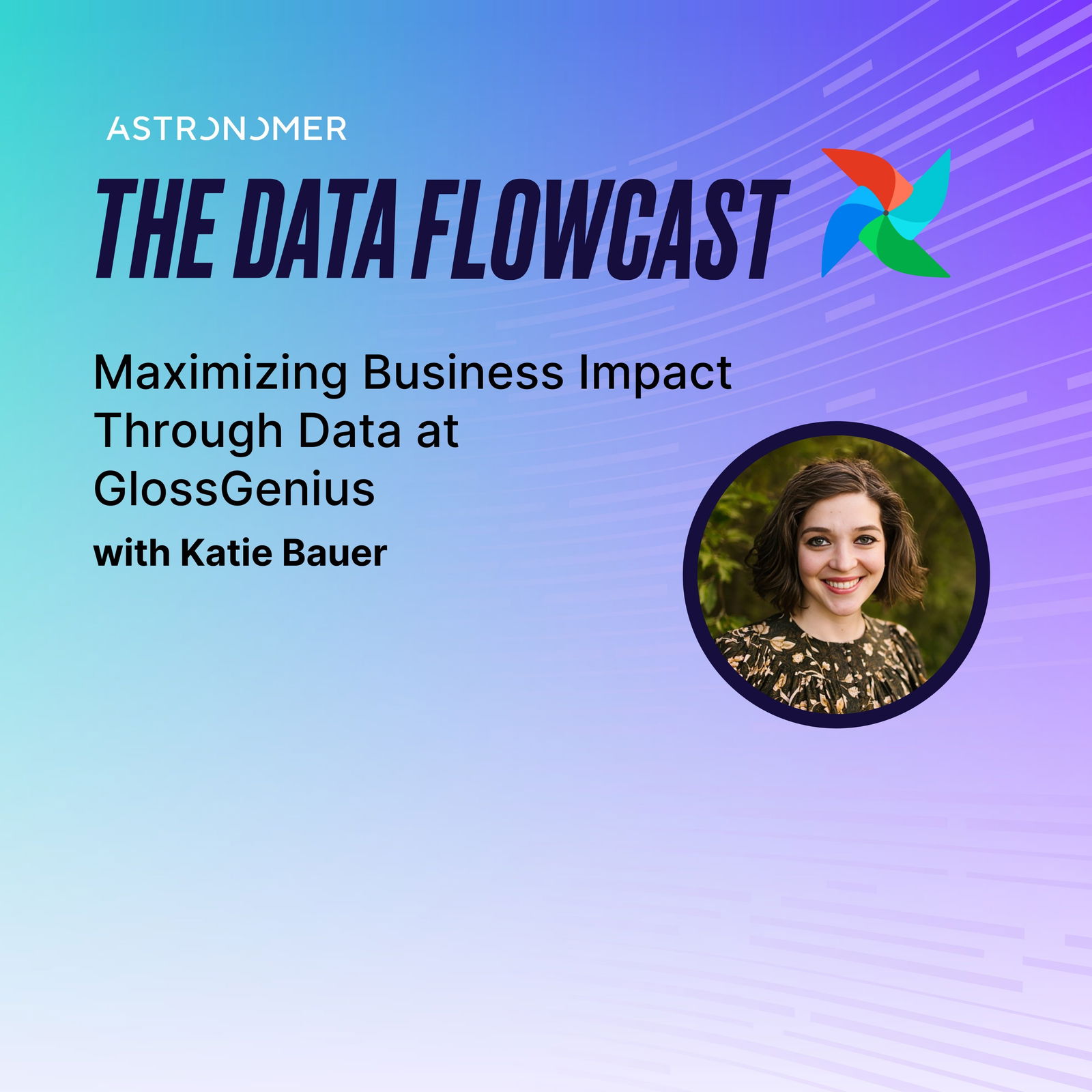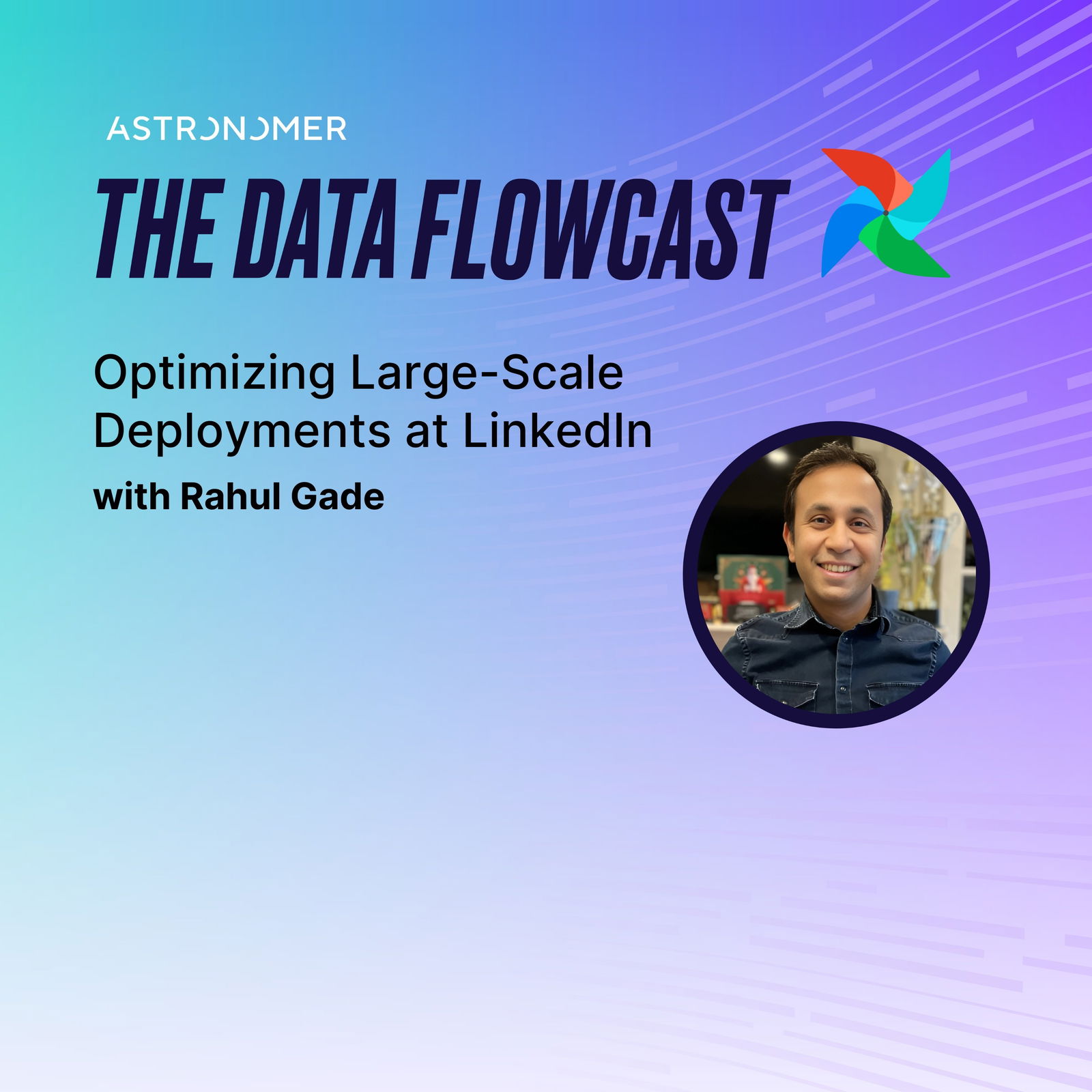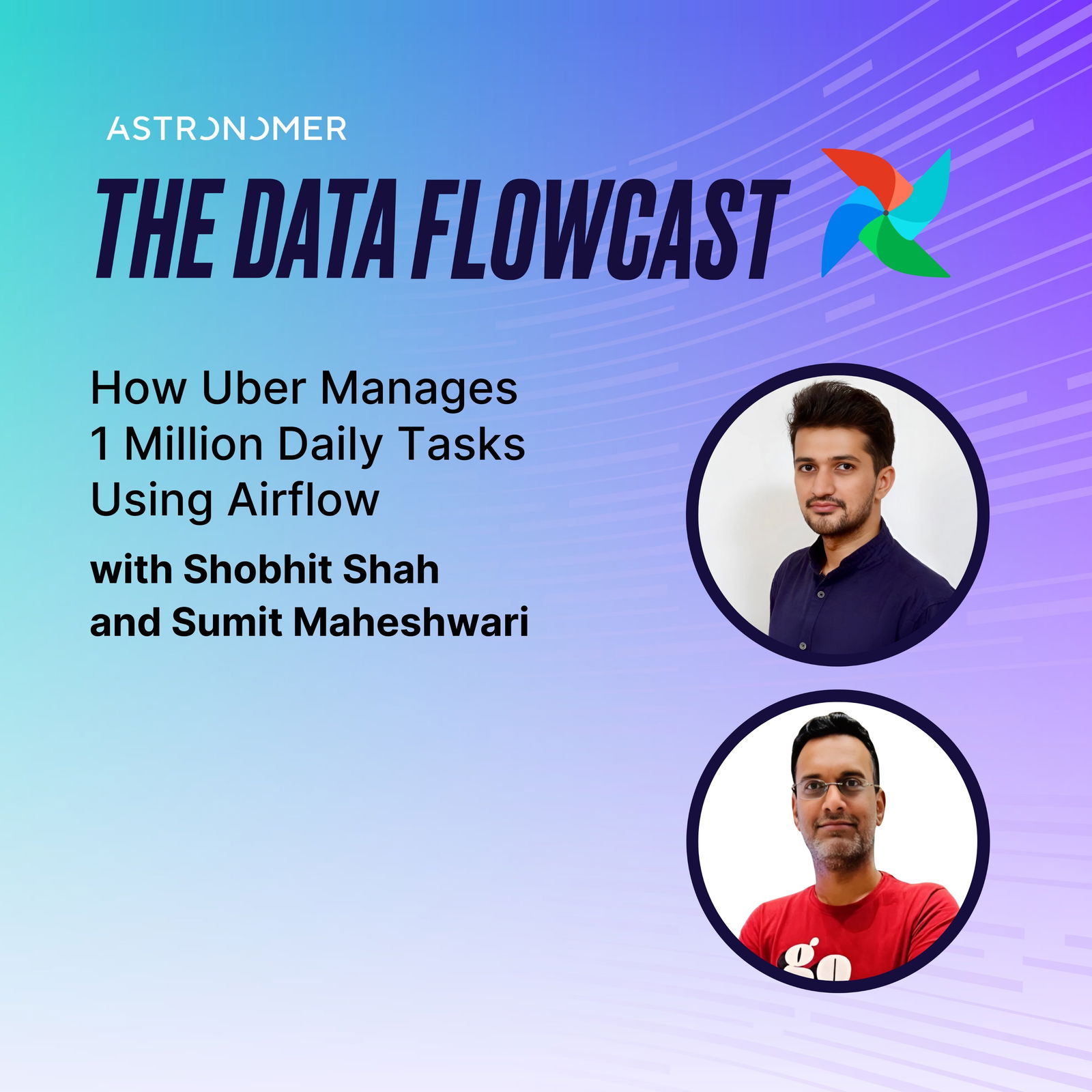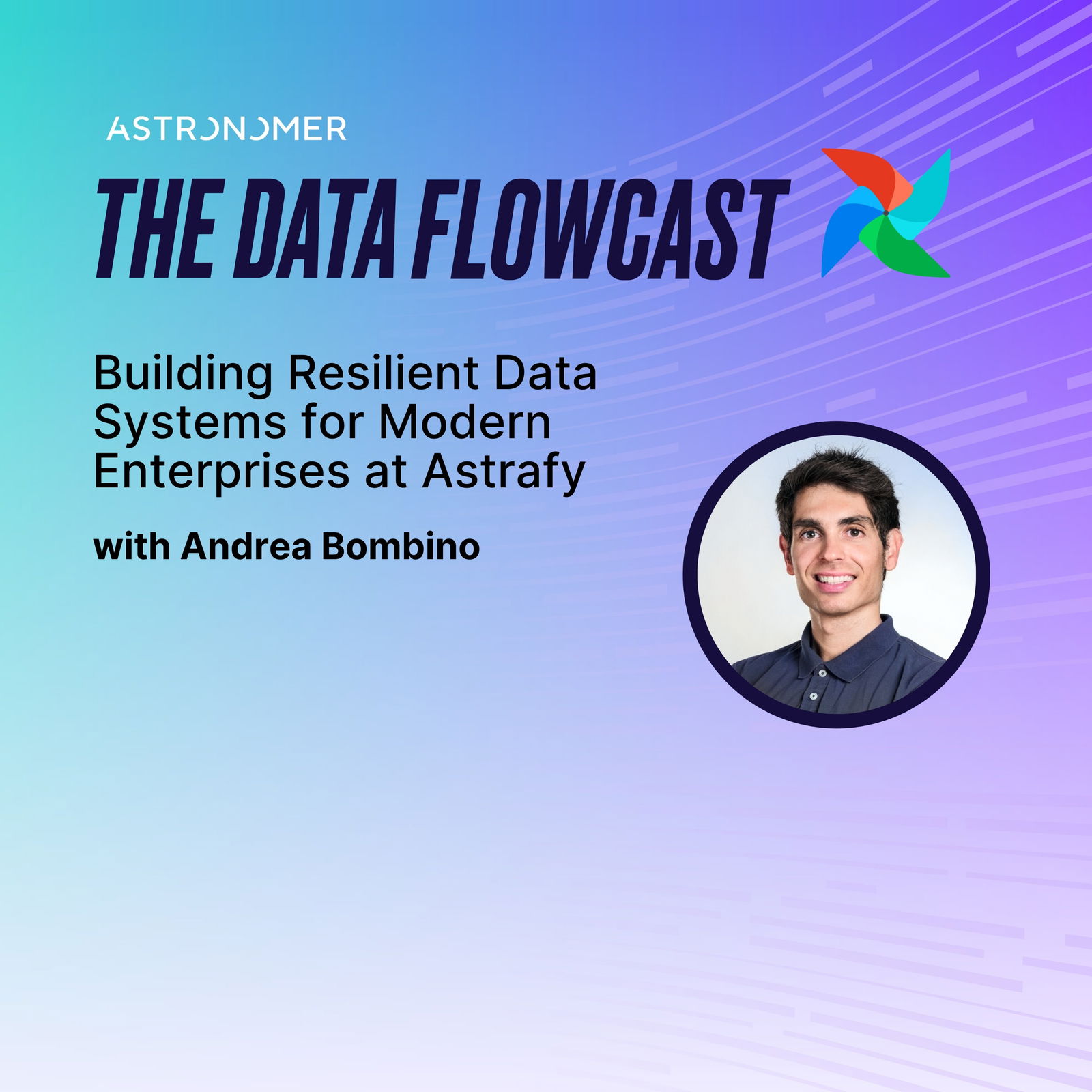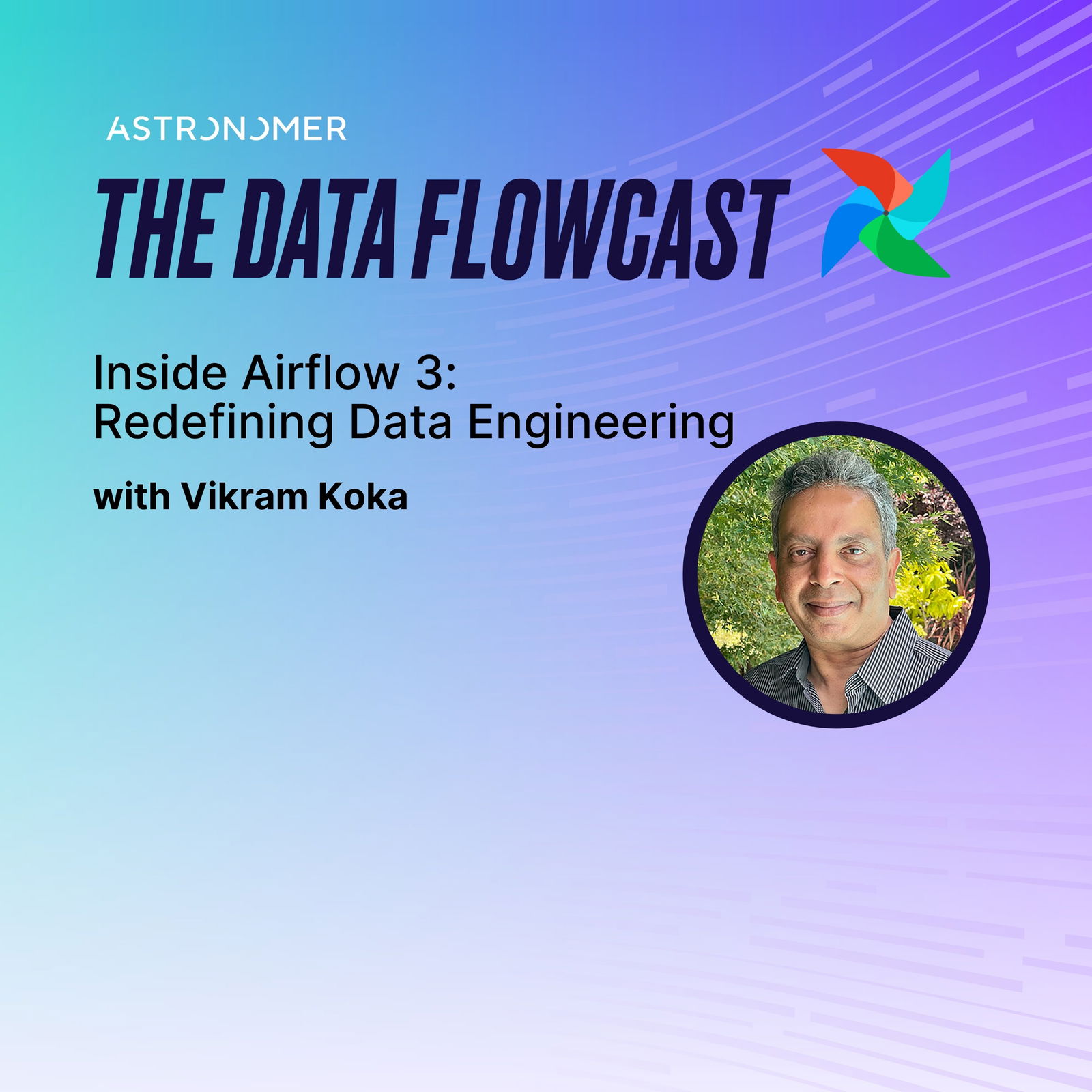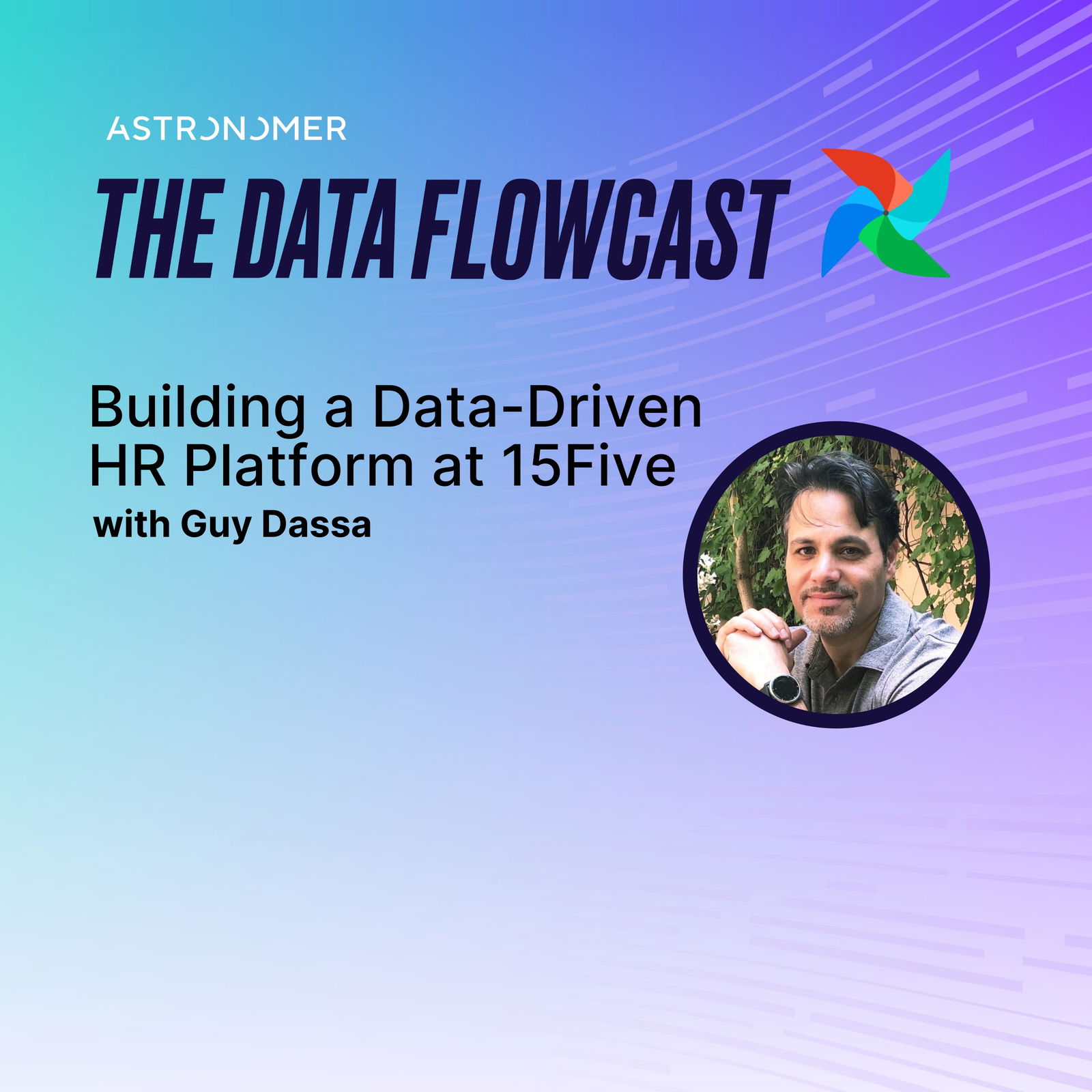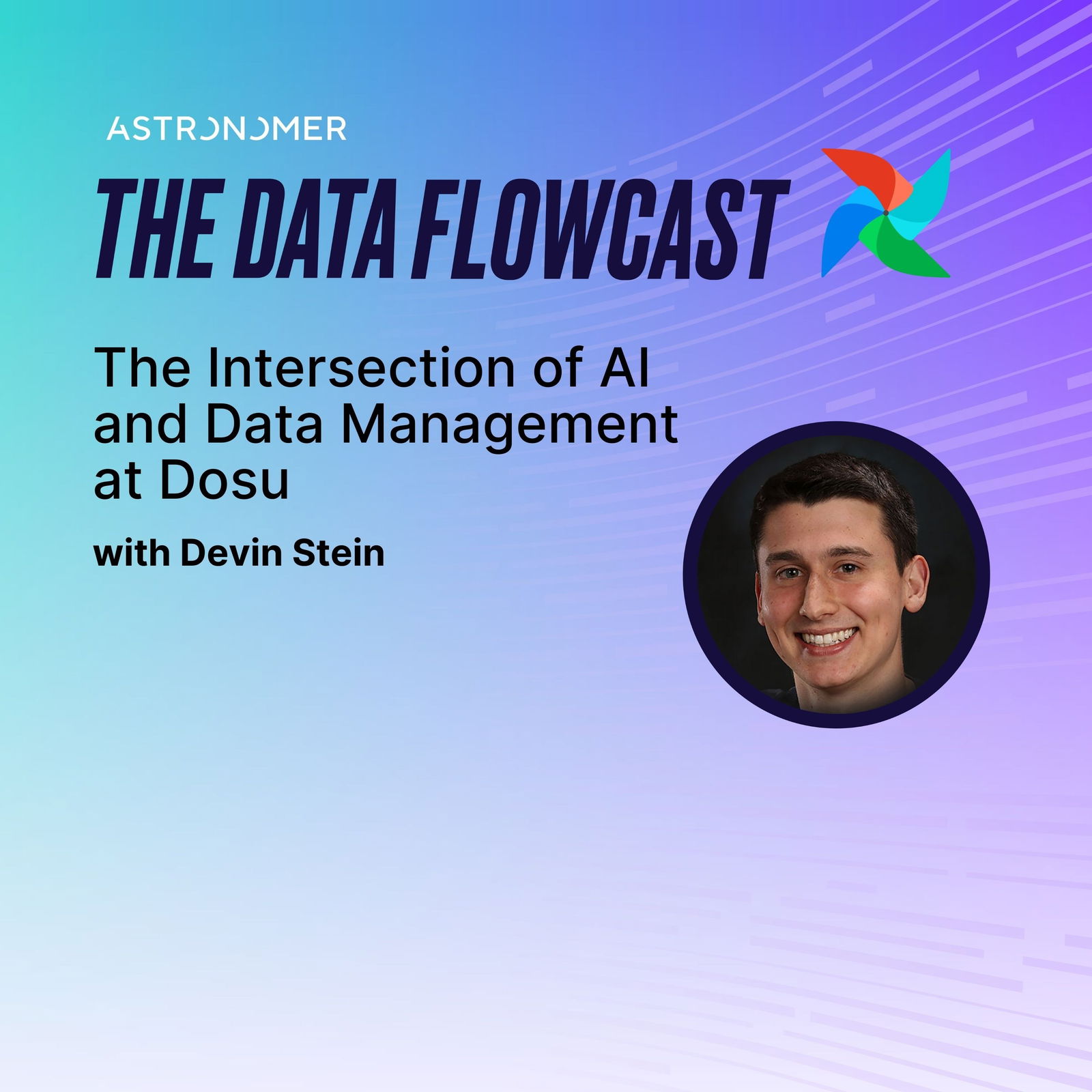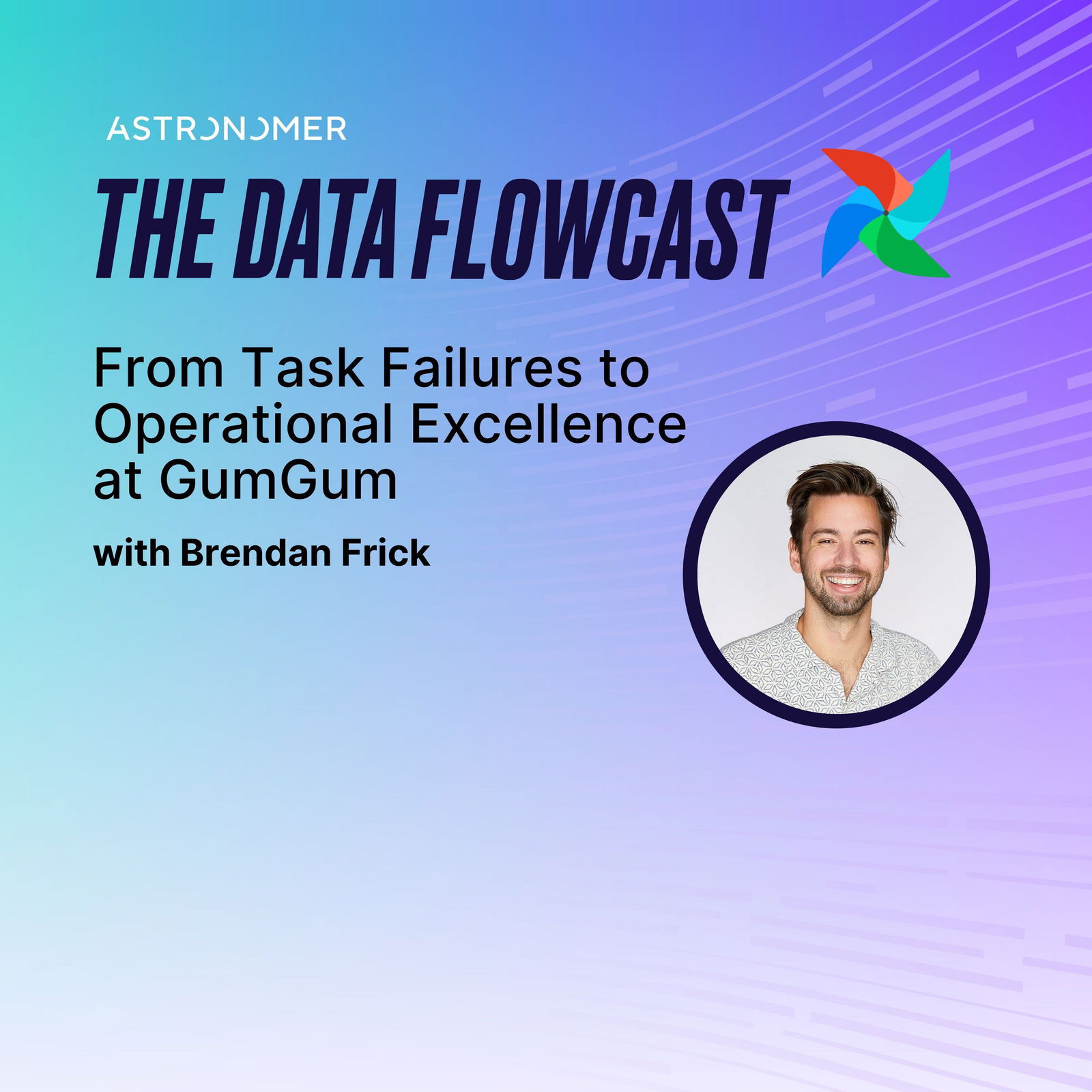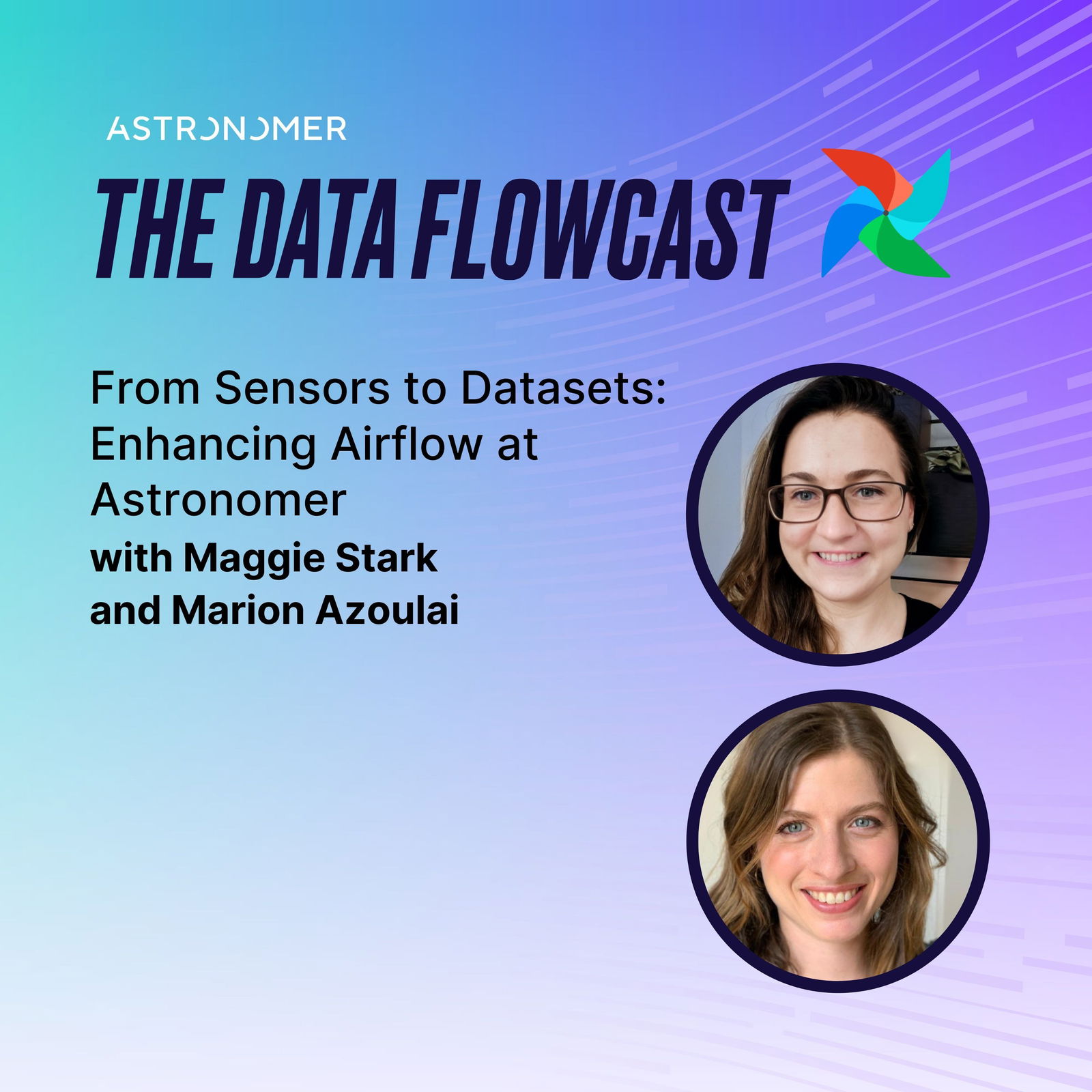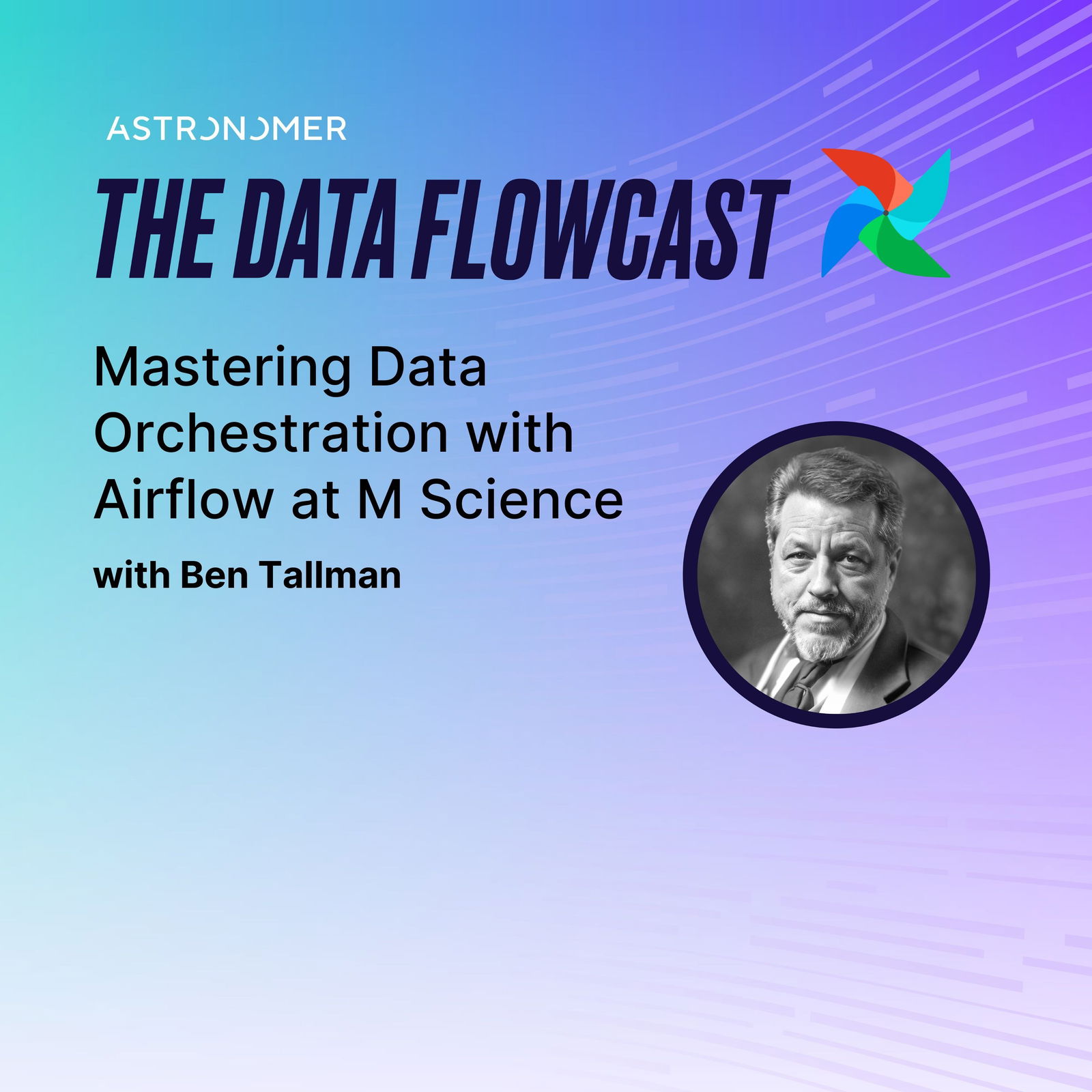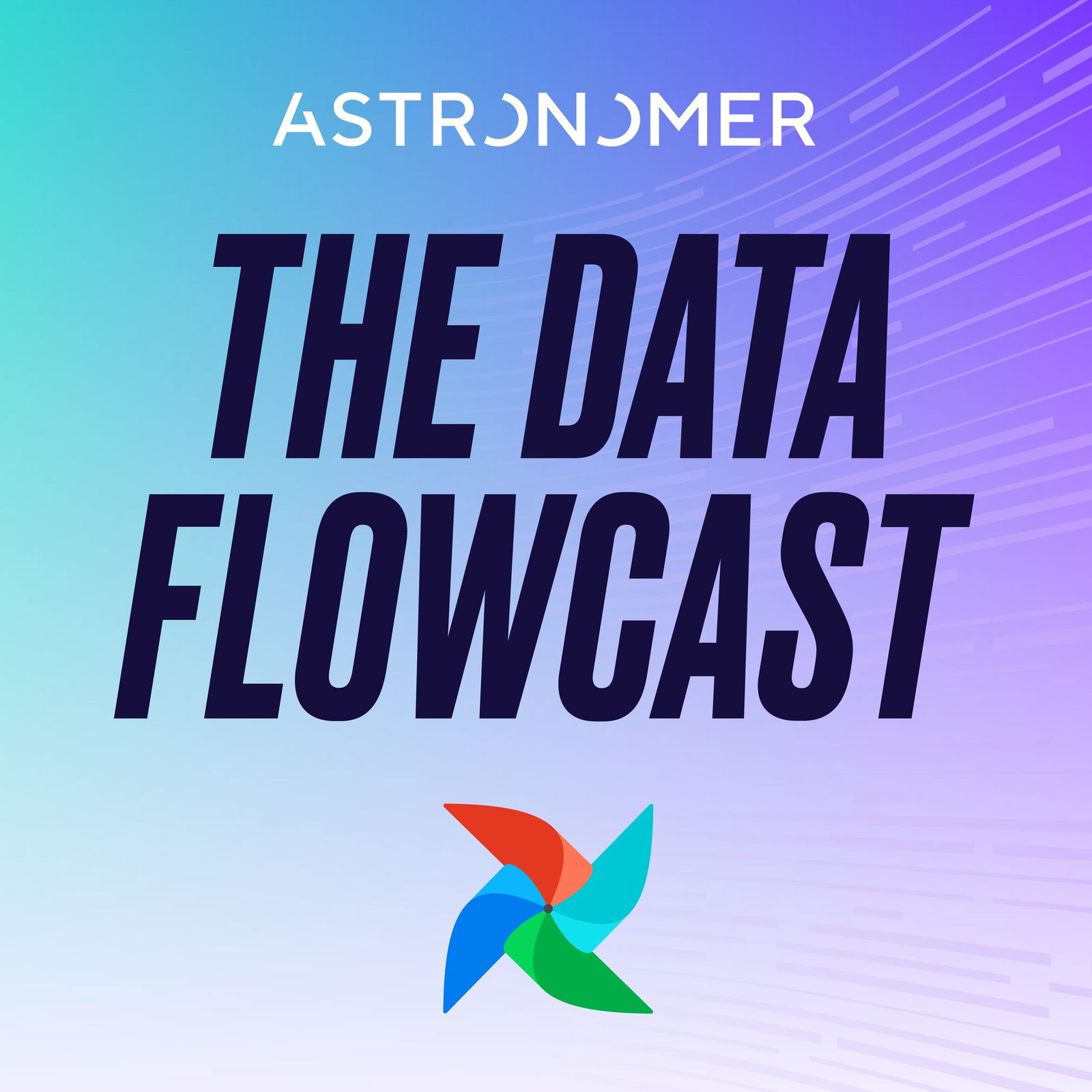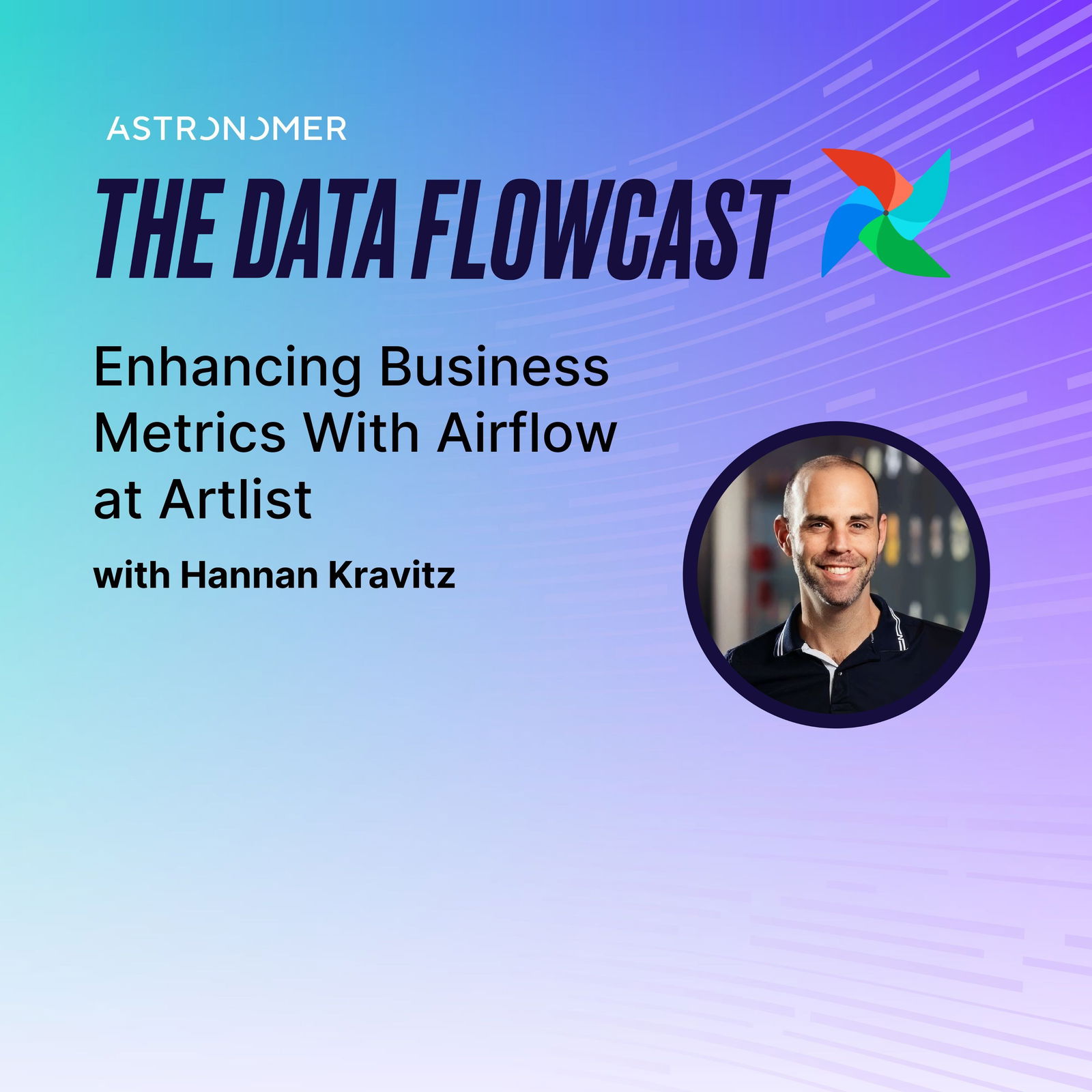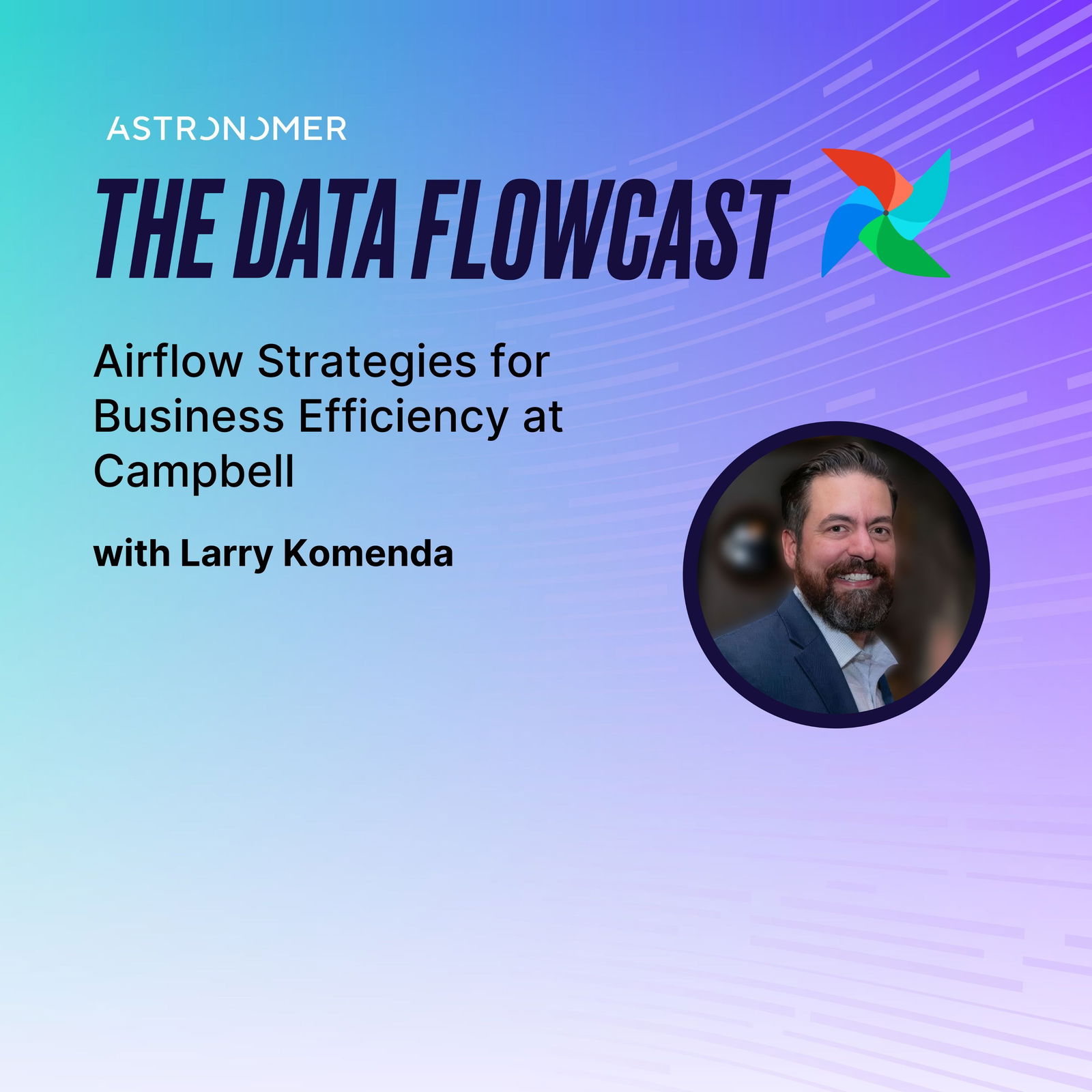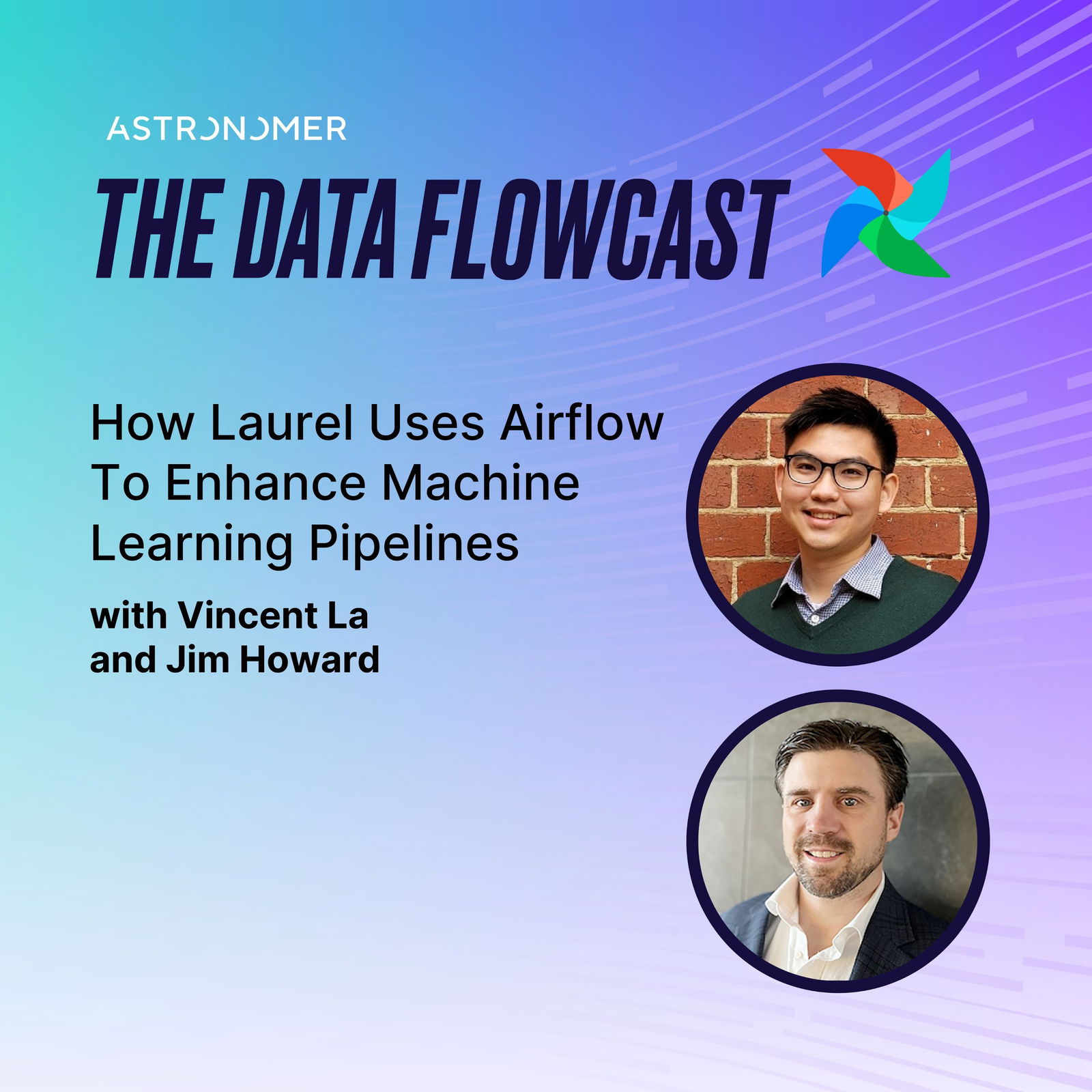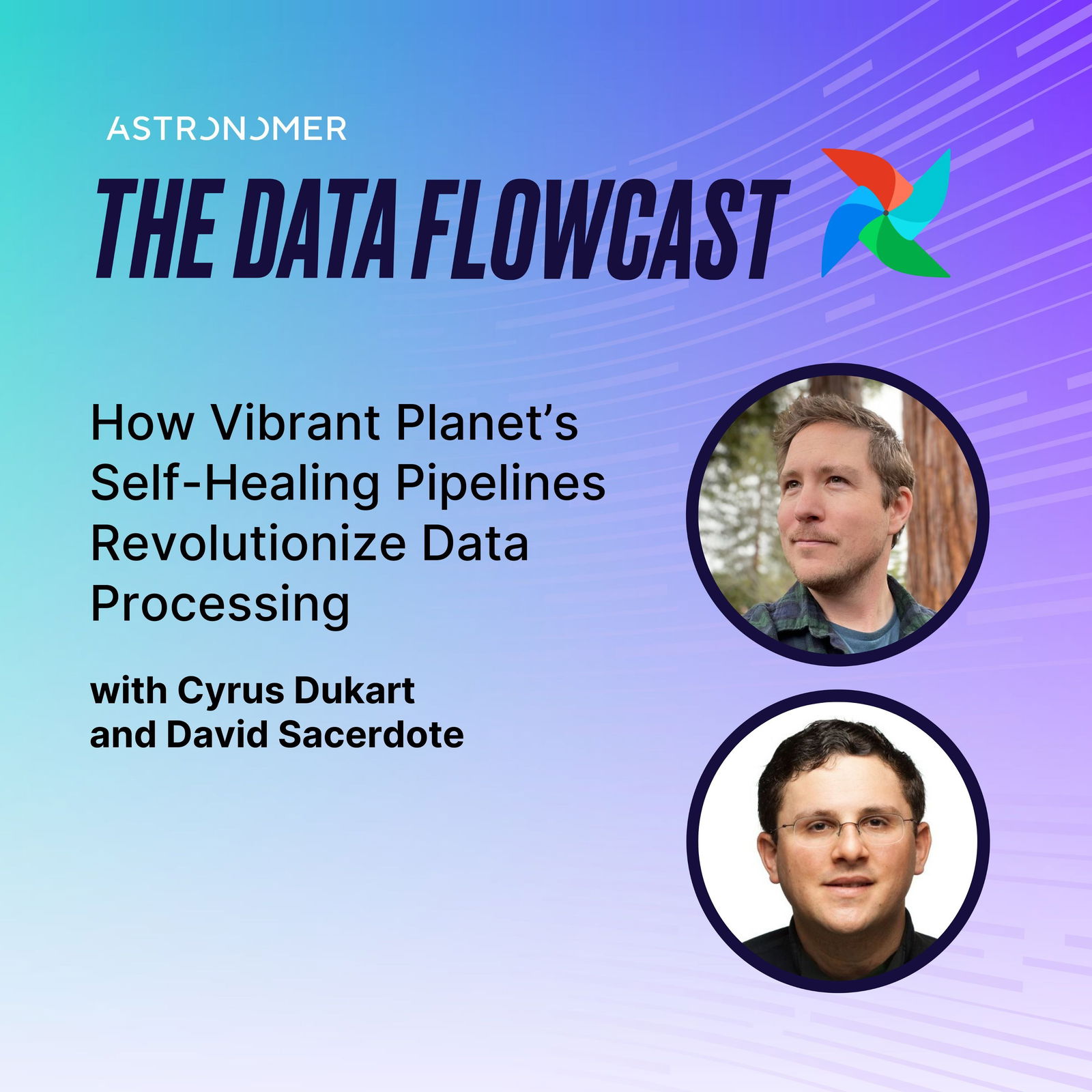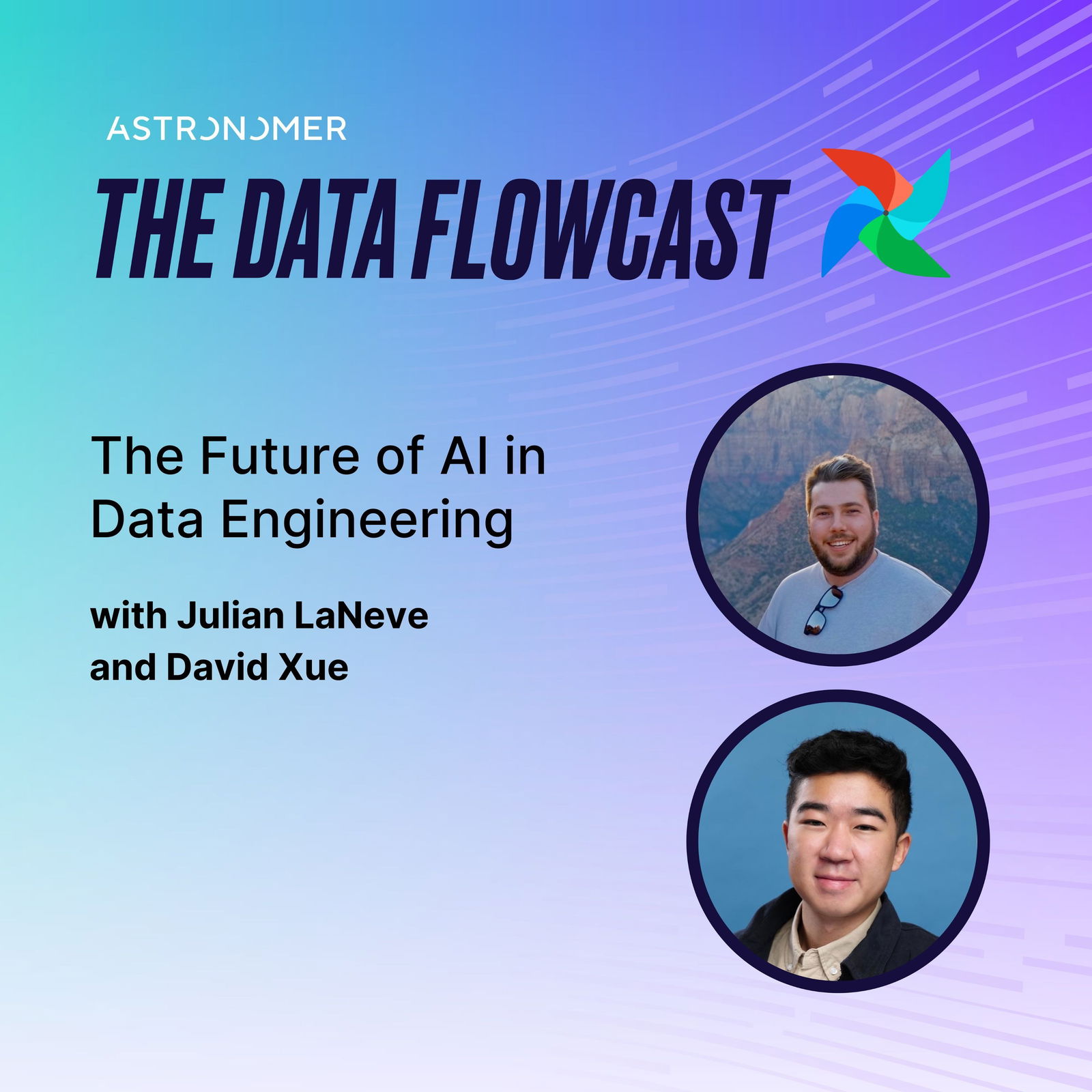Discover The Data Flowcast: Mastering Airflow for Data Engineering & AI
The Data Flowcast: Mastering Airflow for Data Engineering & AI

The Data Flowcast: Mastering Airflow for Data Engineering & AI
Author: Astronomer
Subscribed: 87Played: 1,193Subscribe
Share
© All rights reserved
Description
Welcome to The Data Flowcast: Mastering Airflow for Data Engineering & AI — the podcast where we keep you up to date with insights and ideas propelling the Airflow community forward.
Join us each week, as we explore the current state, future and potential of Airflow with leading thinkers in the community, and discover how best to leverage this workflow management system to meet the ever-evolving needs of data engineering and AI ecosystems.
Podcast Webpage: https://www.astronomer.io/podcast/
Join us each week, as we explore the current state, future and potential of Airflow with leading thinkers in the community, and discover how best to leverage this workflow management system to meet the ever-evolving needs of data engineering and AI ecosystems.
Podcast Webpage: https://www.astronomer.io/podcast/
37 Episodes
Reverse
What does it take to go from fixing a broken link to becoming a committer for one of the world’s leading open-source projects? Amogh Desai, Senior Software Engineer at Astronomer, takes us through his journey with Apache Airflow. From small contributions to building meaningful connections in the open-source community, Amogh’s story provides actionable insights for anyone on the cusp of their open-source journey.Key Takeaways:(02:09) Building data engineering platforms at Cloudera with Kubernetes.(04:00) Brainstorming led to contributing to Apache Airflow.(05:17) Starting small with link fixes, progressing to Breeze development.(07:00) Becoming a committer for Apache Airflow in September 2023.(09:51) The steep learning curve for contributing to Airflow.(16:30) Using GitHub’s “good-first-issue” label to get started.(18:15) Setting up a development environment with Breeze.(22:00) Open-source contributions enhance your resume and career.(24:51) Amogh’s advice: Start small and stay consistent.(28:12) Engage with the community via Slack, email lists and meetups.Resources Mentioned:Amogh Desai -https://www.linkedin.com/in/amogh-desai-385141157/?originalSubdomain=in%20%20https://www.linkedin.com/company/astronomer/Astronomer -https://www.linkedin.com/company/astronomer/Apache Airflow GitHub Repository -https://github.com/apache/airflowContributors Quick Guide -https://github.com/apache/airflow/blob/main/CONTRIBUTING.rstBreeze Development Tool -https://github.com/apache/airflow/tree/main/dev/breezeThanks for listening to “The Data Flowcast: Mastering Airflow for Data Engineering & AI.” If you enjoyed this episode, please leave a 5-star review to help get the word out about the show. And be sure to subscribe so you never miss any of the insightful conversations.#AI #Automation #Airflow #MachineLearning
Data orchestration and machine learning are shaping how organizations handle massive datasets and drive customer-focused strategies. Tools like Apache Airflow are central to this transformation. In this episode, Vasyl Vasyuta, R&D Team Leader at Optimove, joins us to discuss how his team leverages Airflow to optimize data processing, orchestrate machine learning models and create personalized customer experiences.Key Takeaways:(01:59) Optimove tailors marketing notifications with personalized customer journeys.(04:25) Airflow orchestrates Snowflake procedures for massive datasets.(05:11) DAGs manage workflows with branching and replay plugins.(05:41) The "Joystick" plugin enables seamless data replays.(09:33) Airflow supports MLOps for customer data grouping.(11:15) Machine learning predicts customer behavior for better campaigns.(13:20) Thousands of DAGs run every five minutes for data processing.(15:36) Custom versioning allows rollbacks and gradual rollouts.(18:00) Airflow logs enhance operational observability.(23:00) DAG versioning in Airflow 3.0 could boost efficiency.Resources Mentioned:Vasyl Vasyuta -https://www.linkedin.com/in/vasyl-vasyuta-3270b54a/Optimove -https://www.linkedin.com/company/optimove/Apache Airflow -https://airflow.apache.org/Snowflake -https://www.snowflake.com/Datadog -https://www.datadoghq.com/Apache Airflow Survey -https://astronomer.typeform.com/airflowsurvey24Thanks for listening to “The Data Flowcast: Mastering Airflow for Data Engineering & AI.” If you enjoyed this episode, please leave a 5-star review to help get the word out about the show. And be sure to subscribe so you never miss any of the insightful conversations.#AI #Automation #Airflow #MachineLearning
Bridging the gap between data teams and business priorities is essential for maximizing impact and building value-driven workflows. Katie Bauer, Senior Director of Data at GlossGenius, joins us to share her principles for creating effective, aligned data teams. In this episode, Katie draws from her experience at GlossGenius, Reddit and Twitter to highlight the common pitfalls data teams face and how to overcome them. She offers practical strategies for aligning team efforts with organizational goals and fostering collaboration with stakeholders. Key Takeaways:(02:36) GlossGenius provides an all-in-one platform for beauty professionals.(03:59) Airflow orchestrates data and MLOps workflows at GlossGenius.(04:41) Focusing on value helps data teams achieve greater impact.(06:23) Aligning team priorities with company goals minimizes friction.(08:44) Building strong stakeholder relationships requires curiosity.(12:46) Treating roles as flexible fosters team innovation.(13:21) Adapting to new technologies improves effectiveness.(18:28) Acting like your time is valuable earns respect.(23:38) Proactive data initiatives drive strategic value.(24:20) Usage data offers critical insights into tool effectiveness.Resources Mentioned:Katie Bauer -https://www.linkedin.com/in/mkatiebauer/GlossGenius -https://www.linkedin.com/company/glossgenius/Apache Airflow -https://airflow.apache.org/DBT -https://www.getdbt.com/Cosmos -https://cosmos.apache.org/Apache Airflow Survey -https://astronomer.typeform.com/airflowsurvey24Thanks for listening to “The Data Flowcast: Mastering Airflow for Data Engineering & AI.” If you enjoyed this episode, please leave a 5-star review to help get the word out about the show. And be sure to subscribe so you never miss any of the insightful conversations.#AI #Automation #Airflow #MachineLearning
Scaling deployments for a billion users demands innovation, precision and resilience. In this episode, we dive into how LinkedIn optimizes its continuous deployment process using Apache Airflow. Rahul Gade, Staff Software Engineer at LinkedIn, shares his insights on building scalable systems and democratizing deployments for over 10,000 engineers. Rahul discusses the challenges of managing large-scale deployments across 6,000 services and how his team leverages Airflow to enhance efficiency, reliability and user accessibility.Key Takeaways:(01:36) LinkedIn minimizes human involvement in production to reduce errors.(02:00) Airflow powers LinkedIn’s Continuous Deployment platform.(05:43) Continuous deployment adoption grew from 8% to a targeted 80%.(11:25) Kubernetes ensures scalability and flexibility for deployments.(12:04) A custom UI offers real-time deployment transparency.(16:23) No-code YAML workflows simplify deployment tasks.(17:18) Canaries and metrics ensure safe deployments across fabrics.(20:45) A gateway service ensures redundancy across Airflow clusters.(24:22) Abstractions let engineers focus on development, not logistics.(25:20) Multi-language support in Airflow 3.0 simplifies adoption.Resources Mentioned:Rahul Gade -https://www.linkedin.com/in/rahul-gade-68666818/LinkedIn -https://www.linkedin.com/company/linkedin/Apache Airflow -https://airflow.apache.org/Kubernetes -https://kubernetes.io/Open Policy Agent (OPA) -https://www.openpolicyagent.org/Backstage -https://backstage.io/Apache Airflow Survey -https://astronomer.typeform.com/airflowsurvey24Thanks for listening to The Data Flowcast: Mastering Airflow for Data Engineering & AI. If you enjoyed this episode, please leave a 5-star review to help get the word out about the show. And be sure to subscribe so you never miss any of the insightful conversations.#AI #Automation #Airflow #MachineLearning
When data orchestration reaches Uber’s scale, innovation becomes a necessity, not a luxury. In this episode, we discuss the innovations behind Uber’s unique Airflow setup. With our guests Shobhit Shah and Sumit Maheshwari, both Staff Software Engineers at Uber, we explore how their team manages one of the largest data workflow systems in the world. Shobhit and Sumit walk us through the evolution of Uber’s Airflow implementation, detailing the custom solutions that support 200,000 daily pipelines. They discuss Uber's approach to tackling complex challenges in data orchestration, disaster recovery and scaling to meet the company’s extensive data needs.Key Takeaways:(02:03) Airflow as a service streamlines Uber’s data workflows.(06:16) Serialization boosts security and reduces errors.(10:05) Java-based scheduler improves system reliability.(13:40) Custom recovery model supports emergency pipeline switching.(15:58) No-code UI allows easy pipeline creation for non-coders.(18:12) Backfill feature enables historical data processing.(22:06) Regular updates keep Uber aligned with Airflow advancements.(26:07) Plans to leverage Airflow’s latest features.Resources Mentioned:Shobhit Shah -https://www.linkedin.com/in/shahshobhit/Sumit Maheshwar -https://www.linkedin.com/in/maheshwarisumit/Uber -https://www.linkedin.com/company/uber-com/Apache Airflow -https://airflow.apache.org/Airflow Summit -https://airflowsummit.org/Uber -https://www.uber.com/tw/en/Apache Airflow Survey -https://astronomer.typeform.com/airflowsurvey24Thanks for listening to The Data Flowcast: Mastering Airflow for Data Engineering & AI. If you enjoyed this episode, please leave a 5-star review to help get the word out about the show. And be sure to subscribe so you never miss any of the insightful conversations.#AI #Automation #Airflow #MachineLearning
Efficient data orchestration is the backbone of modern analytics and AI-driven workflows. Without the right tools, even the best data can fall short of its potential. In this episode, Andrea Bombino, Co-Founder and Head of Analytics Engineering at Astrafy, shares insights into his team’s approach to optimizing data transformation and orchestration using tools like datasets and Pub/Sub to drive real-time processing. Andrea explains how they leverage Apache Airflow and Google Cloud to power dynamic data workflows. Key Takeaways:(01:55) Astrafy helps companies manage data using Google Cloud.(04:36) Airflow is central to Astrafy’s data engineering efforts.(07:17) Datasets and Pub/Sub are used for real-time workflows.(09:59) Pub/Sub links multiple Airflow environments.(12:40) Datasets eliminate the need for constant monitoring.(15:22) Airflow updates have improved large-scale data operations.(18:03) New Airflow API features make dataset updates easier.(20:45) Real-time orchestration speeds up data processing for clients.(23:26) Pub/Sub enhances flexibility across cloud environments.(26:08) Future Airflow features will offer more control over data workflows.Resources Mentioned:Andrea Bombino -https://www.linkedin.com/in/andrea-bombino/Astrafy -https://www.linkedin.com/company/astrafy/Apache Airflow -https://airflow.apache.org/Google Cloud -https://cloud.google.com/dbt -https://www.getdbt.com/Apache Airflow Survey -https://astronomer.typeform.com/airflowsurvey24Thanks for listening to “The Data Flowcast: Mastering Airflow for Data Engineering & AI.” If you enjoyed this episode, please leave a 5-star review to help get the word out about the show. And be sure to subscribe so you never miss any of the insightful conversations.#AI #Automation #Airflow #MachineLearning
Data orchestration is evolving faster than ever and Apache Airflow 3 is set to revolutionize how enterprises handle complex workflows. In this episode, we dive into the exciting advancements with Vikram Koka, Chief Strategy Officer at Astronomer and PMC Member at The Apache Software Foundation. Vikram shares his insights on the evolution of Airflow and its pivotal role in shaping modern data-driven workflows, particularly with the upcoming release of Airflow 3.Key Takeaways:(02:36) Vikram leads Astronomer’s engineering and open-source teams for Airflow.(05:26) Airflow enables reliable data ingestion and curation.(08:17) Enterprises use Airflow for mission-critical data pipelines.(11:08) Airflow 3 introduces major architectural updates.(13:58) Multi-cloud and edge deployments are supported in Airflow 3.(16:49) Event-driven scheduling makes Airflow more dynamic.(19:40) Tasks in Airflow 3 can run in any language.(22:30) Multilingual task support is crucial for enterprises.(25:21) Data assets and event-based integration enhance orchestration.(28:12) Community feedback plays a vital role in Airflow 3.Resources Mentioned:Vikram Koka -https://www.linkedin.com/in/vikramkoka/Astronomer -https://www.linkedin.com/company/astronomer/The Apache Software Foundation LinkedIn -https://www.linkedin.com/company/the-apache-software-foundation/Apache Airflow LinkedIn - https://www.linkedin.com/company/apache-airflow/Apache Airflow -https://airflow.apache.org/Astronomer -https://www.astronomer.io/The Apache Software Foundation -https://www.apache.org/Join the Airflow slack and/or Dev list -https://airflow.apache.org/community/Apache Airflow Survey -https://astronomer.typeform.com/airflowsurvey24Thanks for listening to The Data Flowcast: Mastering Airflow for Data Engineering & AI. If you enjoyed this episode, please leave a 5-star review to help get the word out about the show. And be sure to subscribe so you never miss any of the insightful conversations.#AI #Automation #Airflow #MachineLearning
Data and AI are revolutionizing HR, empowering leaders to measure performance and drive strategic decisions like never before. In this episode, we explore the transformation of HR technology with Guy Dassa, Chief Technology Officer at 15Five, as he shares insights into their evolving data platform. Guy discusses how 15Five equips HR leaders with tools to measure and take action on team performance, engagement and retention. He explains their data-driven approach, highlighting how Apache Airflow supports their data ingestion, transformation, and AI integration.Key Takeaways:(01:54) 15Five acts as a command center for HR leaders.(03:40) Tools like performance reviews, engagement surveys, and an insights dashboard guide actionable HR steps.(05:33) Data visualization, insights, and action recommendations enhance HR effectiveness to improve their people's outcomes.(07:08) Strict data confidentiality and sanitized AI model training.(09:21) Airflow is central to data transformation and enrichment.(11:15) Airflow enrichment DAGs integrate AI models.(13:33) Integration of Airflow and DBT enables efficient data transformation.(15:28) Synchronization challenges arise with reverse ETL processes.(17:10) Future plans include deeper Airflow integration with AI.(19:31) Emphasizing the need for DAG versioning and improved dependency visibility.Resources Mentioned:Guy Dassa -https://www.linkedin.com/in/guydassa/15Five -https://www.linkedin.com/company/15five/Apache Airflow -https://airflow.apache.org/MLflow -https://mlflow.org/DBT -https://www.getdbt.com/Kubernetes -https://kubernetes.io/RedShift -https://aws.amazon.com/redshift/15Five -https://www.15five.com/Thanks for listening to The Data Flowcast: Mastering Airflow for Data Engineering & AI. If you enjoyed this episode, please leave a 5-star review to help get the word out about the show. And be sure to subscribe so you never miss any of the insightful conversations.#AI #Automation #Airflow #MachineLearning
Unlocking engineering productivity goes beyond coding — it’s about managing knowledge efficiently. In this episode, we explore the innovative ways in which Dosu leverages Airflow for data orchestration and supports the Airflow project. Devin Stein, Founder of Dosu, shares his insights on how engineering teams can focus on value-added work by automating knowledge management. Devin dives into Dosu’s purpose, the significance of AI in their product, and why they chose Airflow as the backbone for scheduling and data management. Key Takeaways:(01:33) Dosu's mission to democratize engineering knowledge.(05:00) AI is central to Dosu's product for structuring engineering knowledge.(06:23) The importance of maintaining up-to-date data for AI effectiveness.(07:55) How Airflow supports Dosu’s data ingestion and automation processes.(08:45) The reasoning behind choosing Airflow over other orchestrators.(11:00) Airflow enables Dosu to manage both traditional ETL and dynamic workflows.(13:04) Dosu assists the Airflow project by auto-labeling issues and discussions.(14:56) Thoughtful collaboration with the Airflow community to introduce AI tools.(16:37) The potential of Airflow to handle more dynamic, scheduled workflows in the future.(18:00) Challenges and custom solutions for implementing dynamic workflows in Airflow.Resources Mentioned:Apache Airflow - https://airflow.apache.org/Dosu Website - https://dosu.dev/Thanks for listening to The Data Flowcast: Mastering Airflow for Data Engineering & AI. If you enjoyed this episode, please leave a 5-star review to help get the word out about the show. And be sure to subscribe so you never miss any of the insightful conversations.#AI #Automation #Airflow #MachineLearning
Harnessing data at scale is the key to driving innovation in autonomous vehicle technology. In this episode, we uncover how advanced orchestration tools are transforming machine learning operations in the automotive industry. Serjesh Sharma, Supervisor ADAS Machine Learning Operations (MLOps) at Ford Motor Company, joins us to discuss the challenges and innovations his team faces working to enhance vehicle safety and automation. Serjesh shares insights into the intricate data processes that support Ford’s Advanced Driver Assistance Systems (ADAS) and how his team leverages Apache Airflow to manage massive data loads efficiently.
Key Takeaways:
(01:44) ADAS involves advanced features like pre-collision assist and self-driving capabilities.
(04:47) Ensuring sensor accuracy and vehicle safety requires extensive data processing.
(05:08) The combination of on-prem and cloud infrastructure optimizes data handling.
(09:27) Ford processes around one petabyte of data per week, using both CPUs and GPUs.
(10:33) Implementing software engineering best practices to improve scalability and reliability.
(15:18) GitHub Issues streamline onboarding and infrastructure provisioning.
(17:00) Airflow's modular design allows Ford to manage complex data pipelines.
(19:00) Kubernetes pod operators help optimize resource usage for CPU-intensive tasks.
(20:35) Ford's scale challenges led to customized Airflow configurations for high concurrency.
(21:02) Advanced orchestration tools are pivotal in managing vast data landscapes in automotive innovation.
Resources Mentioned:
Serjesh Sharma - www.linkedin.com/in/serjeshsharma/
Ford Motor Company - www.linkedin.com/company/ford-motor-company/
Apache Airflow - airflow.apache.org/
Kubernetes - kubernetes.io/
Thanks for listening to The Data Flowcast: Mastering Airflow for Data Engineering & AI. If you enjoyed this episode, please leave a 5-star review to help get the word out about the show. And be sure to subscribe so you never miss any of the insightful conversations.
#AI #Automation #Airflow #MachineLearning
Data failures are inevitable but how you manage them can define the success of your operations. In this episode, we dive deep into the challenges of data engineering and AI with Brendan Frick, Senior Engineering Manager, Data at GumGum. Brendan shares his unique approach to managing task failures and DAG issues in a high-stakes ad-tech environment.
Brendan discusses how GumGum leverages Apache Airflow to streamline data processes, ensuring efficient data movement and orchestration while minimizing disruptions in their operations.
Key Takeaways:
(02:02) Brendan’s role at GumGum and its approach to ad tech.
(04:27) How GumGum uses Airflow for daily data orchestration, moving data from S3 to warehouses.
(07:02) Handling task failures in Airflow using Jira for actionable, developer-friendly responses.
(09:13) Transitioning from email alerts to a more structured system with Jira and PagerDuty.
(11:40) Monitoring task retry rates as a key metric to identify potential issues early.
(14:15) Utilizing Looker dashboards to track and analyze task performance and retry rates.
(16:39) Transitioning from Kubernetes operator to a more reliable system for data processing.
(19:25) The importance of automating stakeholder communication with data lineage tools like Atlan.
(20:48) Implementing data contracts to ensure SLAs are met across all data processes.
(22:01) The role of scalable SLAs in Airflow to ensure data reliability and meet business needs.
Resources Mentioned:
Brendan Frick -
https://www.linkedin.com/in/brendan-frick-399345107/
GumGum -
https://www.linkedin.com/company/gumgum/
Apache Airflow -
https://airflow.apache.org/
Jira -
https://www.atlassian.com/software/jira
Atlan -
https://atlan.com/
Kubernetes -
https://kubernetes.io/
Thanks for listening to The Data Flowcast: Mastering Airflow for Data Engineering & AI. If you enjoyed this episode, please leave a 5-star review to help get the word out about the show. And be sure to subscribe so you never miss any of the insightful conversations.
#AI #Automation #Airflow #MachineLearning
A 13% reduction in failure rates — this is how two data scientists at Astronomer revolutionized their data pipelines using Apache Airflow.
In this episode, we enter the world of data orchestration and AI with Maggie Stark and Marion Azoulai, both Senior Data Scientists at Astronomer. Maggie and Marion discuss how their team re-architected their use of Airflow to improve scalability, reliability and efficiency in data processing. They share insights on overcoming challenges with sensors and how moving to datasets transformed their workflows.
Key Takeaways:
(02:23) The data team’s role as a centralized hub within Astronomer.
(05:11) Airflow is the backbone of all data processes, running 60,000 tasks daily.
(07:13) Custom task groups enable efficient code reuse and adherence to best practices.
(11:33) Sensor-heavy architectures can lead to cascading failures and resource issues.
(12:09) Switching to datasets has improved reliability and scalability.
(14:19) Building a control DAG provides end-to-end visibility of pipelines.
(16:42) Breaking down DAGs into smaller units minimizes failures and improves management.
(19:02) Failure rates improved from 16% to 3% with the new architecture.
Resources Mentioned:
Maggie Stark -
https://www.linkedin.com/in/margaretstark/
Marion Azoulai -
https://www.linkedin.com/in/marionazoulai/
Astronomer | LinkedIn -
https://www.linkedin.com/company/astronomer/
Apache Airflow -
https://airflow.apache.org/
Astronomer | Website -
https://www.astronomer.io/
Thanks for listening to The Data Flowcast: Mastering Airflow for Data Engineering & AI. If you enjoyed this episode, please leave a 5-star review to help get the word out about the show. And be sure to subscribe so you never miss any of the insightful conversations.
#AI #Automation #Airflow #MachineLearning
Mastering the flow of data is essential for driving innovation and efficiency in today’s competitive landscape. In this episode, we explore the evolution of data orchestration and the pivotal role of Apache Airflow in modern data workflows.
Ben Tallman, Chief Technology Officer at M Science, joins us and shares his extensive experience with Airflow, detailing its early adoption, evolution and the profound impact it has had on data engineering practices. His insights reveal how leveraging Airflow can streamline complex data processes, enhance observability and ultimately drive business success.
Key Takeaways:
(02:31) Benjamin’s journey with Airflow and its early adoption.
(05:36) The transition from legacy schedulers to Airflow at Apigee and later Google.
(08:52) The challenges and benefits of running production-grade Airflow instances.
(10:46) How Airflow facilitates the management of large-scale data at M Science.
(11:56) The importance of reducing time to value for customers using data products.
(13:32) Airflow’s role in ensuring observability and reliability in data workflows.
(17:00) Managing petabytes of data and billions of records efficiently.
(19:08) Integration of various data sources and ensuring data product quality.
(20:04) Leveraging Airflow for data observability and reducing time to value.
(22:04) Benjamin’s vision for the future development of Airflow, including audit trails for variables.
Resources Mentioned:
Ben Tallman -
https://www.linkedin.com/in/btallman/
M Science -
https://www.linkedin.com/company/m-science-llc/
Apache Airflow -
https://airflow.apache.org/
Astronomer -
https://www.astronomer.io/
Databricks -
https://databricks.com/
Snowflake -
https://www.snowflake.com/
Thanks for listening to The Data Flowcast: Mastering Airflow for Data Engineering & AI. If you enjoyed this episode, please leave a 5-star review to help get the word out about the show. And be sure to subscribe so you never miss any of the insightful conversations.
#AI #Automation #Airflow #MachineLearning
Welcome to The Data Flowcast: Mastering Airflow for Data Engineering & AI — the podcast where we keep you up to date with insights and ideas propelling the Airflow community forward.
Join us each week, as we explore the current state, future and potential of Airflow with leading thinkers in the community, and discover how best to leverage this workflow management system to meet the ever-evolving needs of data engineering and AI ecosystems.
#AI #Automation #Airflow #MachineLearning
Data orchestration is revolutionizing the way companies manage and process data. In this episode, we explore the critical role of data orchestration in modern data workflows and how Apache Airflow is used to enhance data processing and AI model deployment.
Hannan Kravitz, Data Engineering Team Leader at Artlist, joins us to share his insights on leveraging Airflow for data engineering and its impact on their business operations.
Key Takeaways:
(01:00) Hannan introduces Artlist and its mission to empower content creators.
(04:27) The importance of collecting and modeling data to support business insights.
(06:40) Using Airflow to connect multiple data sources and create dashboards.
(09:40) Implementing a monitoring DAG for proactive alerts within Airflow.
(12:31) Customizing Airflow for business metric KPI monitoring and setting thresholds.
(15:00) Addressing decreases in purchases due to technical issues with proactive alerts.
(17:45) Customizing data quality checks with dynamic task mapping in Airflow.
(20:00) Desired improvements in Airflow UI and logging capabilities.
(21:00) Enabling business stakeholders to change thresholds using Streamlit.
(22:26) Future improvements desired in the Airflow project.
Resources Mentioned:
Hannan Kravitz -
https://www.linkedin.com/in/hannan-kravitz-60563112/
Artlist -
https://www.linkedin.com/company/art-list/
Apache Airflow -
https://airflow.apache.org/
Snowflake -
https://www.snowflake.com/
Streamlit -
https://streamlit.io/
Thanks for listening to The Data Flowcast: Mastering Airflow for Data Engineering & AI. If you enjoyed this episode, please leave a 5-star review to help get the word out about the show. And be sure to subscribe so you never miss any of the insightful conversations.
#AI #Automation #Airflow #MachineLearning
Data engineering is constantly evolving and staying ahead means mastering tools like Apache Airflow. In this episode, we explore the world of data engineering with Alexandre Magno Lima Martins, Senior Data Engineer at Teya. Alexandre talks about optimizing data workflows and the smart solutions they've created at Teya to make data processing easier and more efficient.
Key Takeaways:
(02:01) Alexandre explains his role at Teya and the responsibilities of a data platform engineer.
(02:40) The primary use cases of Airflow at Teya, especially with dbt and machine learning projects.
(04:14) How Teya creates self-service DAGs for dbt models.
(05:58) Automating DAG creation with CI/CD pipelines.
(09:04) Switching to a multi-file method for better Airflow performance.
(12:48) Challenges faced with Kubernetes Executor vs. Celery Executor.
(16:13) Using Celery Executor to handle fast tasks efficiently.
(17:02) Implementing KEDA autoscaler for better scaling of Celery workers.
(19:05) Reasons for not using Cosmos for DAG generation and cross-DAG dependencies.
(21:16) Alexandre's wish list for future Airflow features, focusing on multi-tenancy.
Resources Mentioned:
Alexandre Magno Lima Martins -
https://www.linkedin.com/in/alex-magno/
Teya -
https://www.linkedin.com/company/teya-global/
Apache Airflow -
https://airflow.apache.org/
dbt -
https://www.getdbt.com/
Kubernetes -
https://kubernetes.io/
KEDA -
https://keda.sh/
Thanks for listening to The Data Flowcast: Mastering Airflow for Data Engineering & AI. If you enjoyed this episode, please leave a 5-star review to help get the word out about the show. And be sure to subscribe so you never miss any of the insightful conversations.
#AI #Automation #Airflow #MachineLearning
Managing data workflows well can change the game for any company. In this episode, we talk about how Airflow makes this possible. Larry Komenda, Chief Technology Officer at Campbell, shares how Airflow supports their operations and improves efficiency.
Larry discusses his role at Campbell, their switch to Airflow, and its impact. We look at their strategies for testing and maintaining reliable workflows and how these help their business.
Key Takeaways:
(02:26) Strong technology and data systems are crucial for Campbell’s investment process.
(05:03) Airflow manages data pipelines efficiently in the market data team.
(07:39) Airflow supports various departments, including trading and operations.
(09:22) Machine learning models run on dedicated Airflow instances.
(11:12) Reliable workflows are ensured through thorough testing and development.
(13:45) Business tasks are organized separately from Airflow for easier testing.
(15:30) Non-technical teams have access to Airflow for better efficiency.
(17:20) Thorough testing before deploying to Airflow is essential.
(19:10) Non-technical users can interact with Airflow DAGs to solve their issues.
(21:55) Airflow improves efficiency and reliability in trading and operations.
(24:40) Enhancing the Airflow UI for non-technical users is important for accessibility.
Resources Mentioned:
Larry Komenda -
https://www.linkedin.com/in/larrykomenda/
Campbell -
https://www.linkedin.com/company/campbell-and-company/
30% off Airflow Summit Ticket -
https://ti.to/airflowsummit/2024/discount/30DISC_ASTRONOMER
Apache Airflow -
https://airflow.apache.org/
NumPy -
https://numpy.org/
Python -
https://www.python.org/
Thanks for listening to The Data Flowcast: Mastering Airflow for Data Engineering & AI. If you enjoyed this episode, please leave a 5-star review to help get the word out about the show. And be sure to subscribe so you never miss any of the insightful conversations.
#AI #Automation #Airflow #MachineLearning
The world of timekeeping for knowledge workers is transforming through the use of AI and machine learning. Understanding how to leverage these technologies is crucial for improving efficiency and productivity.
In this episode, we’re joined by Vincent La, Principal Data Scientist at Laurel, and Jim Howard, Principal Machine Learning Engineer at Laurel, to explore the implementation of AI in automating timekeeping and its impact on legal and accounting firms.
Key Takeaways:
(01:54) Laurel's mission in time automation.
(03:39) Solving clustering, prediction and summarization with AI.
(06:30) Daily batch jobs for user time generation.
(08:22) Knowledge workers touch 300 items daily.
(09:01) Mapping 300 activities to seven billable items.
(11:38) Retraining models for better performance.
(14:00) Using Airflow for retraining and backfills.
(17:06) RAG-based summarization for user-specific tone.
(18:58) Testing Airflow DAGs for cost-effective summarization.
(22:00) Enhancing Airflow for long-running DAGs.
Resources Mentioned:
Vincent La -
https://www.linkedin.com/in/vincentla/
Jim Howard -
https://www.linkedin.com/in/jameswhowardml/
Laurel -
https://www.linkedin.com/company/laurel-ai/
Apache Airflow -
https://airflow.apache.org/
Ernst & Young -
https://www.ey.com/
Thanks for listening to The Data Flowcast: Mastering Airflow for Data Engineering & AI. If you enjoyed this episode, please leave a 5-star review to help get the word out about the show. And be sure to subscribe so you never miss any of the insightful conversations.
#AI #Automation #Airflow #MachineLearning
Discover the cutting-edge methods Vibrant Planet uses to revolutionize geospatial data processing and resource management.
In this episode, we delve into the intricacies of scaling geospatial data processing and resource allocation with experts from Vibrant Planet. Joining us are Cyrus Dukart, Engineering Lead, and David Sacerdote, Staff Software Engineer, who share their innovative approaches to handling large datasets and optimizing resource use in Airflow.
Key Takeaways:
(00:00) Inefficiencies in resource allocation.
(03:00) Scientific validity of sharded results.
(05:53) Tech-based solutions for resource management.
(06:11) Retry callback process for resource allocation.
(08:00) Running database queries for resource needs.
(10:05) Importance of remembering resource usage.
(13:51) Generating resource predictions.
(14:44) Custom task decorator for resource management.
(20:28) Massive resource usage gap in sharded data.
(21:14) Fail-fast model for long-running tasks.
Resources Mentioned:
Cyrus Dukart -
https://www.linkedin.com/in/cyrus-dukart-6561482/
David Sacerdote -
https://www.linkedin.com/in/davidsacerdote/
Vibrant Planet -
https://www.linkedin.com/company/vibrant-planet/
Apache Airflow -
https://airflow.apache.org/
Kubernetes -
https://kubernetes.io/
Vibrant Planet -
https://vibrantplanet.net/
Thanks for listening to The Data Flowcast: Mastering Airflow for Data Engineering & AI. If you enjoyed this episode, please leave a 5-star review to help get the word out about the show. And be sure to subscribe so you never miss any of the insightful conversations.
#AI #Automation #Airflow #MachineLearning
The world of data orchestration and machine learning is rapidly evolving, and tools like Apache Airflow are at the forefront of these changes. Understanding how to effectively utilize these tools can significantly enhance data processing and AI model deployment.
This episode features Julian LaNeve, CTO at Astronomer, and David Xue, Machine Learning Engineer at Astronomer. They delve into the intricacies of data orchestration, generative AI and the practical applications of these technologies in modern data workflows.
Key Takeaways:
(01:51) The pressure to engage in the generative AI space.
(02:02) Generative AI can elevate data utilization to the next level.
(02:43) The transparency issues with commercial AI models.
(04:27) High-quality data in model performance is crucial.
(06:40) Running new models on smaller devices, like phones.
(12:19) Fine-tuning LLMs to handle millions of task failures.
(16:54) Teaching AI to understand specific logs, not general passages, is a goal.
(21:56) Using Airflow as a general-purpose orchestration tool.
(22:00) Airflow is adaptable for various use cases, including ETL and ML systems.
Resources Mentioned:
Julian LaNeve - https://www.linkedin.com/in/julianlaneve/
Atronomer - https://www.linkedin.com/company/astronomer/
David Xue - https://www.linkedin.com/in/david-xue-uva/
Apache Airflow - https://airflow.apache.org/
Meta’s Open Source Llama 3 model: https://ai.meta.com/blog/meta-llama-3/https://ai.meta.com/blog/meta-llama-3/
Microsoft’s Phi-3 model: https://www.microsoft.com/en-us/research/publication/phi-3-technical-report-a-highly-capable-language-model-locally-on-your-phone/
GPT-4 - https://www.openai.com/research/gpt-4
Thanks for listening to The Data Flowcast: Mastering Airflow for Data Engineering & AI. If you enjoyed this episode, please leave a 5-star review to help get the word out about the show. And be sure to subscribe so you never miss any of the insightful conversations.
#ai #automation #airflow #machinelearning
Comments
Top Podcasts
The Best New Comedy Podcast Right Now – June 2024The Best News Podcast Right Now – June 2024The Best New Business Podcast Right Now – June 2024The Best New Sports Podcast Right Now – June 2024The Best New True Crime Podcast Right Now – June 2024The Best New Joe Rogan Experience Podcast Right Now – June 20The Best New Dan Bongino Show Podcast Right Now – June 20The Best New Mark Levin Podcast – June 2024
 United States
United States

